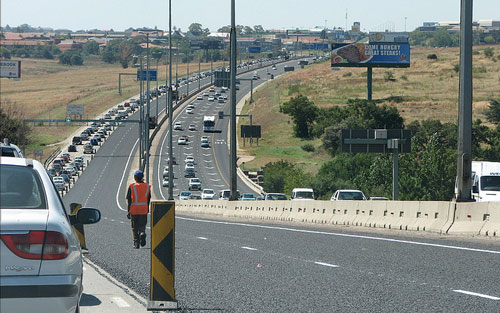
The Democratic Alliance has challenged a public finance economist on his finding that the e-tolling system will not affect the poor. “The statement that toll fees on the Gauteng Freeway Improvement Project (GFIP) will only make the rich poorer and not hit the poor, cannot go unchallenged,” DA MPL Neil Campbell said on Wednesday.
“The claim that most poor people will not have to pay tolls as they use public transport is not accurate as not all taxis and buses will travel toll free, but rather only those with licences and on approved routes.”
On Tuesday, Roelof Botha told reporters that the GFIP would result in unmitigated success and tangible benefits for the country. “It will make the rich poorer, not the poor poorer,” he said in Johannesburg.
Botha’s research found that the project would result in the highest income earning quintile (20% of the richest people) in Gauteng paying up to 94% of the toll fees, while most of the poor people would stick to public transport.
He said the project would maintain SA’s international credit ratings, obviate the need for fuel levy increases, allow rapid investment in road construction, alleviate traffic congestion, and enhance safety.
Botha argued that commuting time saved (because of four lanes) would translate into productive earnings.
Campbell disagreed and said that the cost of every item transported along the toll roads would increase because hauliers would resort to raising their prices for transporting goods.
“This will impact on every resident in Gauteng, as the price of every item transported, including food, will rise.”
He contended that every home owner would also have their rates increased because of additional municipal road maintenance required due to increased pressure on roads by drivers avoiding the toll roads.
“The so-called benefits mentioned by Botha of decreased traffic congestion on the tolled roads will be temporary as the number of cars using the freeway will increase by 7%/year, reaching capacity in just two years,” said Campbell.
“He [Botha] also disregards the enormous toll collection costs that will be saved with a simple fuel levy.”
The DA strongly disagreed with Botha’s stance and reaffirmed its opposition to toll roads in Gauteng.
Last year, the SA National Roads Agency announced that tolling was imminent on 185km of the N1, N3, N12 and R21 around Johannesburg and Pretoria. In terms of GFIP, these roads and their interchanges had been improved and costs estimated at around R20bn would be recouped through toll charges.
Light motor vehicles were expected to be charged 40c/km, medium vehicles R1/km, “longer” vehicles R2/km and bikers 24c/km. Qualifying commuter taxis and buses would be exempt.
E-tolling was placed on hold in January after a huge outcry that tolls were unaffordable. — Sapa
- Image: ThisParticularGreg/Flickr
- Subscribe to our free daily newsletter
- Follow us on Twitter or on Google+ or on Facebook
- Visit our sister website, SportsCentral (still in beta)



